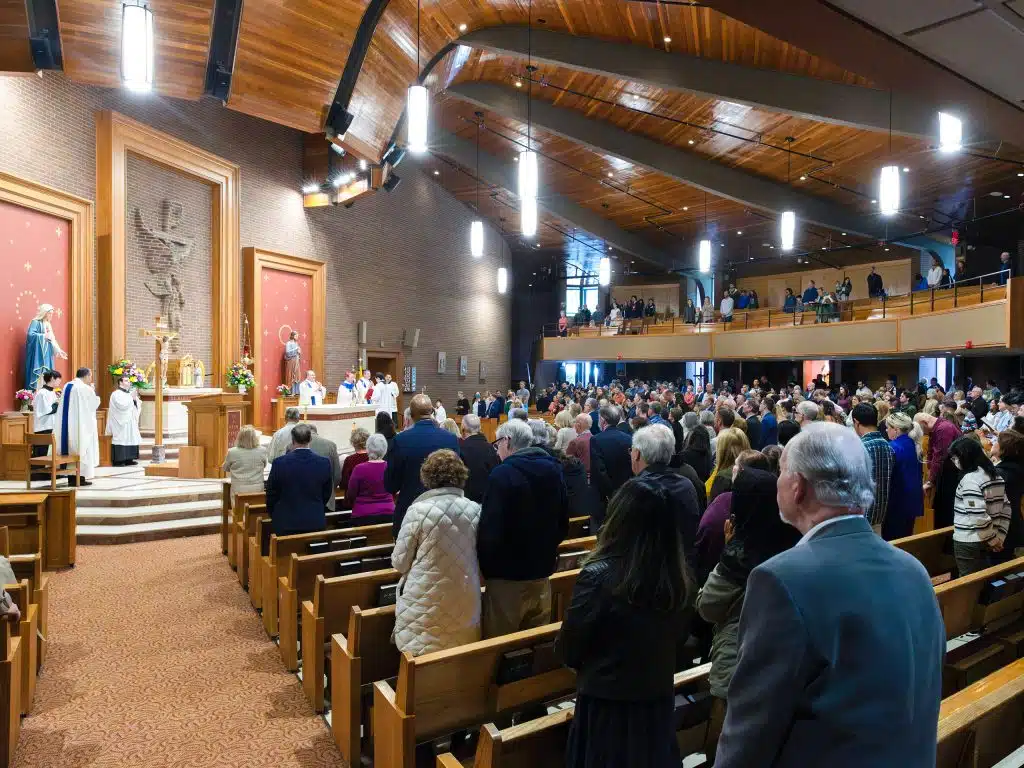A godparent is someone who serves as a sponsor for a person being baptized. A sponsor is a member of the church community who supports the person being baptized in his or her faith life. This practice reflects the ecclesial nature of faith: Baptism is a sacrament of faith, and while each member of the church must confess the faith insofar as he or she is able, Catholics do not have faith individualistically. Rather, we receive faith as a gift from God within the community of faith, the church. There is also a true sense in which we receive faith as a gift from the church — not only from the ministers of the sacrament of baptism, by which the theological virtue of faith is infused, but also from other believers — especially parents and godparents, who seek baptism on our behalf and who raise, instruct and support us in the faith.
The Catechism of the Catholic Church teaches that godparents should be “firm believers, able and ready to help the newly baptized — child or adult — on the road of Christian life” (CCC 1255). Godparents must, therefore, have a strong and living faith, and they should be supportive of or even instrumental in the catechesis and ongoing formation of the newly baptized person.
Canon law stipulates certain minimal qualifications of godparents (see CIC 874). First, the godparents must be chosen by the parents or, in certain cases, those appropriately acting in their place, and the godparents must have the capacity and intention to serve as godparents. Second, godparents must normally be at least 16 years old. Third, a godparent must be a Catholic in good standing who has been confirmed and has received the holy Eucharist. This person must be living a life of faith as befits the role of a godparent. Fourth, the godparent cannot be the father or mother of the person being baptized.
Sometimes parents wish to have a non-Catholic friend or relative serve as a godparent. While this is not possible, a baptized person who is not Catholic can serve as a “Christian witness” to the baptism along with at least one Catholic godparent. It is not permissible to have only a witness and not a godparent. Someone who is not Christian can neither serve as a witness nor as a godparent. A child can have up to two godparents, but only one godparent is required. Canon law states: “Only one male or one female sponsor or one of each sex is to be employed” (CIC 873). Therefore, if a child has two godparents, they must be of opposite sex, in keeping with the analogy to natural parenthood.
Given the responsibilities that faith and incorporation into the church entail, the godparent should be someone who can help the newly baptized person to understand and live out these responsibilities. Specifically, this can include things such as helping the newly baptized to understand the message of salvation contained in the Bible; to live the liturgical and sacramental life of the church; to implement the practical demands of the beatitudes and the decalogue; and to find, accept and fulfill his or her personal vocation. One of the most powerful ways a godparent can do this is by personal example. Therefore, prospective godparents should be authentic examples of Christian charity.
A godparent should also defend the faith of the person he or she sponsors. Just as parents must protect their young children from harm, godparents should be instrumental in safeguarding the faith of the newly baptized so that it can be nurtured and grow to full stature. In this respect, godparents must nurture their own faith through prayer and ongoing formation.
One of the most important things a godparent can do for the person he or she sponsors is to pray regularly for that person. But just as grace builds on nature, so too it is beneficial for the godparent to maintain an ongoing relationship with the person being baptized in order to help guide him or her in growing as a Christian, in the same way that the presence of biological parents in a child’s life is crucial not just for begetting the child, but also for raising the child. Maturing in faith by enhancing one’s understanding of what the church believes and seeking to integrate one’s life with it is a lifelong process.
Matava is associate professor of theology and dean of Christendom Graduate School of Theology in Alexandria.


